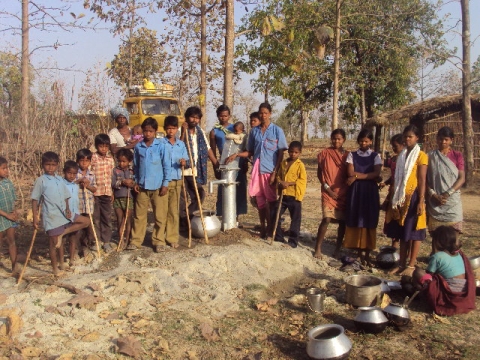
A well of their own: A CGnet Swara phone call brought water to the remote Indian village of Sajan Khar, after a decade of government inaction. Hem Singh Markam, left of the pump, made the call.
For 10 years the government promised the remote Indian village of Sajan Khar its own well, and for 10 years the villagers struggled with the same four-mile trek to fetch drinking water for themselves and their animals.
Then early this year, Hem Singh Markam used a cell phone to call for help. And 15 days later, two hand-pump wells were delivered.
It is the latest example of what happens when indigenous, tribal communities are able to make their voices heard. That phone call went out to CGnet Swara, created by Knight International Journalism Fellow Shubhranshu Choudhary. CGnet is a cellular network that carries news from the remote, central region of Chhattisgarh to wider India. Activists, mainstream media, government officials and the general public can all access the news via phone or on the CGnet website.
“Thank you!” Markam said in a phone call to CGnet Swara. “My village has wells and we thank you!”
Markam’s family, along with about 50 other members of the Baiga community, had left their homes in the forests of Central India after the government promised them land in Sajan Khar. Since then, the villagers have sent repeated requests for a well to India’s Public Health Engineering Department. Markam also started taking the requests in person to a local office of the department. All they got were assurances that the village would soon have a well.
The days turned into weeks, then months, and then years. Finally an acquaintance told Markam about CGnet Swara. The first time he called, his posting got no response. Then the moderator suggested he include a phone number for the official in charge, which he did.
"After the story was posted on the CGnet system, officials in the state capital of Raipur and even a high-ranking official in the Chief Minister's office heard the message and pressured the local officers to resolve the problem," said Choudhary.
Fifteen days after Markam's message, the well equipment arrived. Villagers scrambled to find the equipment needed to dig deep holes to install the wells, and today they have easy access to fresh, clean water.
Markam – who had polio as a child and found the old four-mile trek for water difficult – said CGnet Swara has made him feel powerful, as if he has the support of powerful people.
“Actually,” Choudhary said, “there is a power that comes from communicating, from making your voice heard. With CGnet, indigenous people – tribal people – now have this power.”